Content
No one will dispute the fact that grapes are a heat-loving plant. But today there are many gardeners who grow it outside the warm regions of Russia. Enthusiasts use varieties for planting that can tolerate harsh climatic conditions. Breeders help them very well in this, creating ever new frost-resistant varieties of grapes.
One of these winter-hardy varieties is the Pamyat Dombkowska grape. This is an interesting variety that is gaining popularity among gardeners. If you are interested in the Pamyat Dombkowska grapes, a description of the variety, photos and reviews from gardeners will be presented to your attention in our article. Look at the first photo, how handsome he is!
History of creation
The author of the Pamyati Dombkovskaya variety is Fedor Ilyich Shatilov, a breeder from the city of Orenburg. The variety was created in 1983. The varieties Zarya Severa and Kishmish Universal were used as parents. The resulting variety received from its parents frost resistance, high productivity and a special delicate taste.
The grape received its name, which gardeners all over the world know today, only in 1990. Shatilov named the variety in honor of the untimely deceased employee of the breeding station, Yanina Adamovna Dombkovskaya.In the same year, the Pamyati Dombkovskaya variety was recorded in the State Register.
The most interesting thing is that in order to distribute the Dombkovskaya grape variety, Shatilov himself donated the grown cuttings in large quantities to Chelyabinsk residents who wanted to grow grapes. Currently, the variety is in demand, especially among gardeners living in the northern regions.
Description
It is clear that a self-respecting gardener will never plant any plants without learning about their characteristics. That is why we begin the story about Pamyat Dombkovskaya grapes with a description and photo, so that the idea of the variety is complete.
Description of the bush
Shatilov's grapes belong to the table-raisin varieties. The bushes are strong, strong, and grow quickly. The powerful vine grows up to 5 meters over the summer and ripens along its entire length, regardless of weather conditions.
Three-lobed dark green leaves are attached to long petioles. The pubescence of the leaf blade is almost imperceptible, similar to a light cobweb.
Bunches and berries
The clusters of Pamyatya Dombkowska grapes are dense, practically without peas, and have a cylindrical or conical shape. Weight varies from 300 to 400 grams if 3 grains are left on the shoot. In the case when there is only one bunch, its weight reaches one kilogram.
A description of the variety would be incomplete without a story about the berries. They are blue-black in color, quite large, round, slightly elongated in shape. The skin is thin, with a whitish coating of wild yeast.Inside the berry there is juicy and sweet pink pulp.
Since the Pamyati Dombkovskaya variety belongs to raisin grapes, it has no seeds. Although some soft rudiments are sometimes found. An excellent option for making juice, compote, raisins and wine.
Characteristics
To properly appreciate the Pamyat Dombkowska grape variety, photos and descriptions will not be enough.
Therefore, let’s also present a characteristic:
- High and stable yield; with good care, one bush produces 150 kg of tasty and sweet fruits.
- Winter hardiness (the vine can withstand temperatures of -30 degrees) allows the variety to be cultivated in the northern regions. The grapes of Pamyatya Dombkovskaya, according to reviews from gardeners in the Moscow region, adapt well to their gardens.
- Mass ripening of the bunches begins in September.
- The variety is resistant to many grape diseases, but mildew and oidium, anthracnose, and gray rot often affect the vine.
- Recovers well after wintering and illness.
Features of cultivation and care
Based on the characteristics of the Pamyat Dombkowska grape variety, as well as the description of the variety, gardeners plant the vine in fertile soil. By the way, planting and caring for a plant are almost the same. But you need to pay special attention to the issues of processing, pruning and shelter for the winter. The yield of grapes depends on the correct implementation of these procedures.
When and how to spray
To spray grape plantations, tank mixtures are used: several preparations are placed in one container. This treatment destroys not only disease spores, but also pests, and is also a kind of feeding for the grapevine.
The procedure is carried out in the evening, which will avoid burns. And when choosing drugs, you need to pay attention to their compatibility. Beginners, of course, will have a hard time at first.
A one-time treatment of Pamyat Dombkowska grapes, according to experienced gardeners, against diseases, will not give a positive result. There is a certain scheme:
- before buds open in early spring;
- before flowering begins;
- when the berries look like peas;
- in the fall, before covering the vine for the winter.
It turns out that only 4 times. But sometimes, in special cases, additional processing is carried out.
We would also like to draw your attention to some advice from gardeners with extensive experience in growing the Dombkowska grape variety. In comments and reviews, they recommend pollinating a wet vine with ash. This is not just foliar feeding, but also an opportunity to get rid of an invasion of mice and other rodents before covering the grapes for the winter.
Trimming Features
For successful cultivation and obtaining a rich and stable harvest, pruning of Pamyat Dombkowska grapes should be carried out annually:
- In summer, the crown is thinned out and the shoots are removed. In addition, the leaves located close to the brush are torn off so that there is enough light.
- At the end of August, you need to plan the initial pruning of the shoots so that the plant has additional strength to prepare for winter, and the vine has time to ripen along its entire length.To do this, cut off the tops of the shoots by 20 or 40 centimeters, depending on the length of the shoot.
- The second part of the operation is planned for October, when the leaves have fallen. On a branch that bears fruit in the summer, a couple of the most developed and ripened shoots are left. One of them (fruit tree) is cut to 2 buds, and the second (replacement branch) to 7 or 15. All other branches are removed.
- Trimmed bushes, as well as the soil, are treated with copper or iron sulfate and prepared for shelter. This pruning pattern is repeated every fall.
- In the spring you will need to break off the frozen branches. But gardeners do not recommend postponing pruning in full until spring. Juice flows out of the cuts and the vine dries out.
Sheltering the vine for the winter
In the northern regions, as well as in the Moscow region, Dombkovskaya grapes must be covered for the winter. We will now present photos and descriptions of the work.
After processing and pruning, the vine is removed from the supports and laid on spruce branches or straw. A layer of the same material is thrown on top. To prevent autumn rains from falling on the grapes and the shelter, arcs are installed over the vine and covered with non-woven material. It is best to use spunbond. It will not only keep moisture out, but will also create the necessary microclimate.
When the air temperature drops below -5 degrees, the grapes need to be completely covered, sprinkled with a layer of soil of at least 30 cm. If the winter is snowy, then a snow cover will be enough.
The photo below shows various options for covering grapes for the winter and a video.
Proper shelter of grapes is the key to harvest:
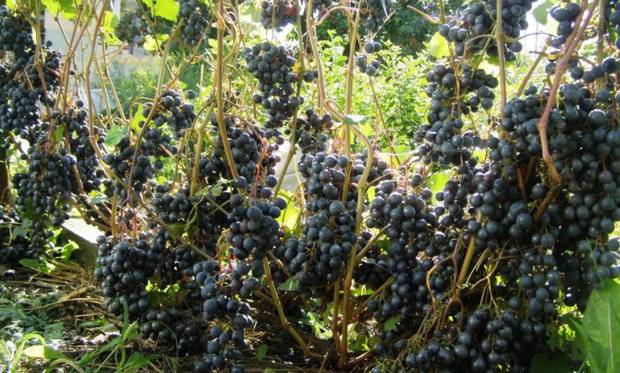
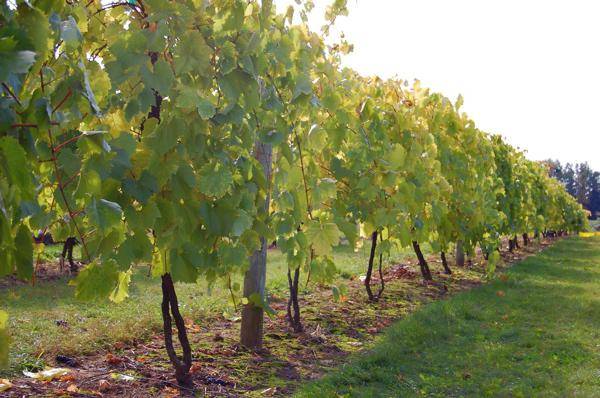
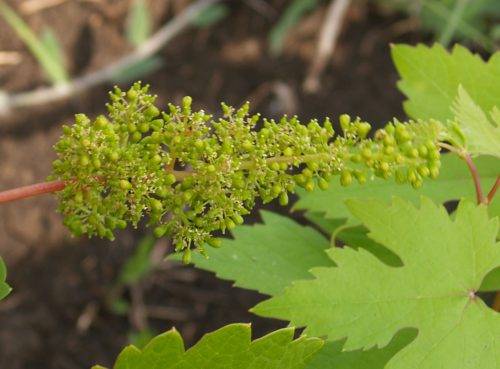
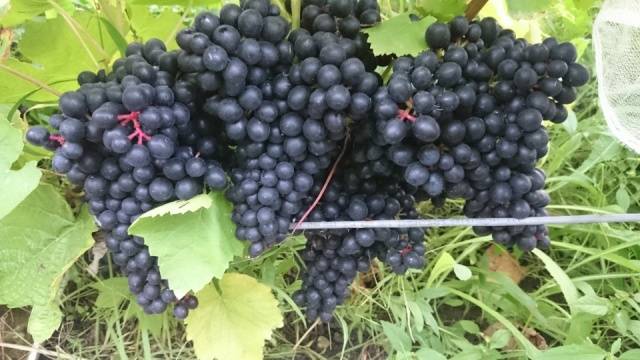
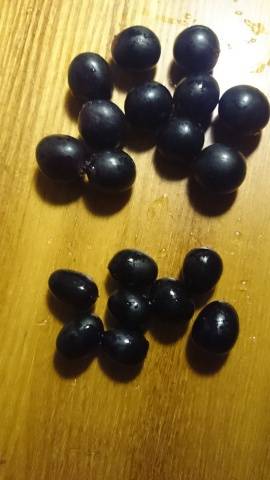
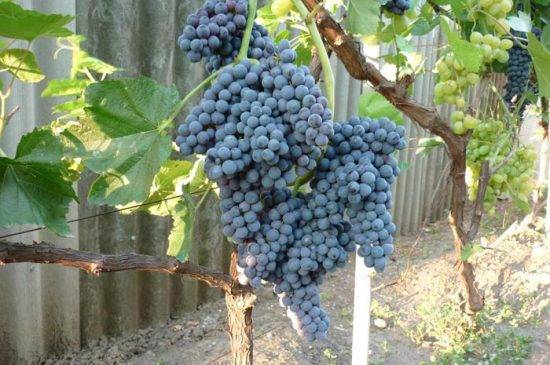
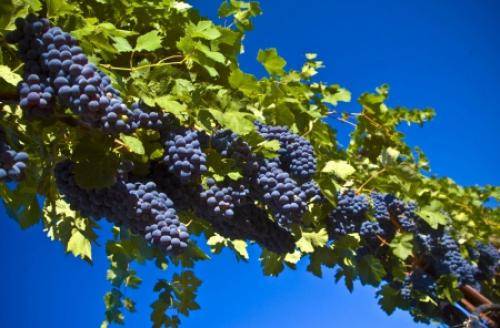
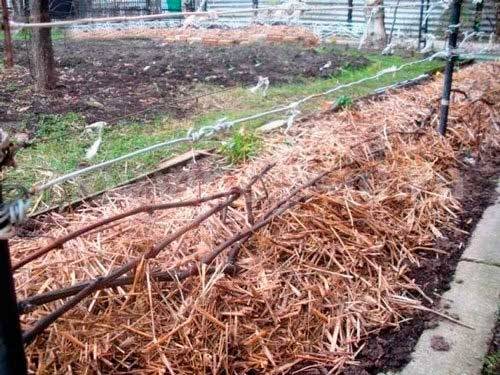
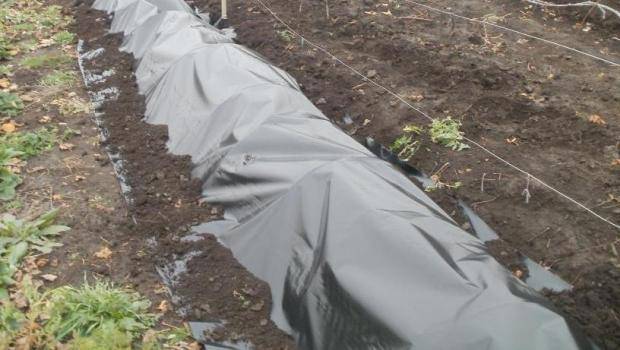
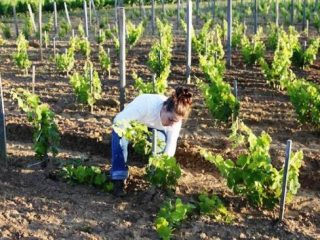
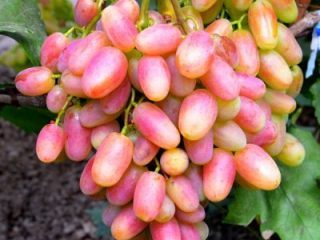
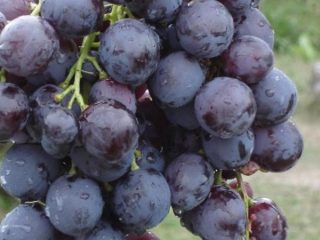

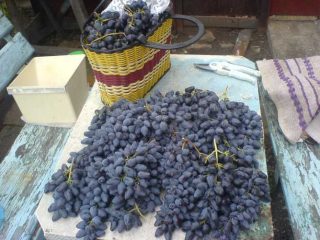
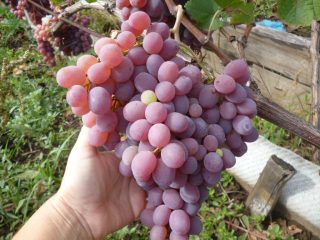
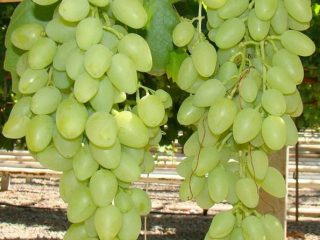
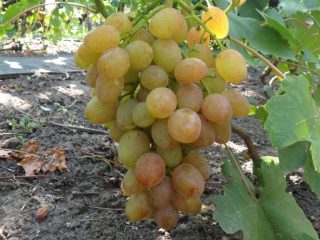
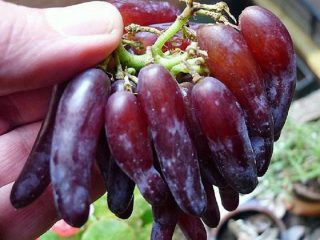
I couldn’t find any information anywhere about this grape variety in Memory of Dombkowska, whether it’s self-rooted or grafted.
I am a beginner winegrower. I planted this grape variety in 2018. This year I removed three control bunches of grapes. I am pleased with the active growth and maturation of the vine. Now, at the end of August 2019, two vines are ripening in each of the 2 directions and one more branch from one on different sides of the vines. I’m thinking about how to properly prune vines in October. It is not clear in the description of the variety that it is described to prune the fruit vine to 2 buds. and the replacement knot is 7-15. Is it so?
Good afternoon
Yes that's right. Those shoots that bear fruit are cut off, leaving 2-3 buds on them. Replacement knots are cut off, leaving from 7 to 15 healthy buds on them.
I grew the Pamyati Dombkovskaya variety for 15 years. The variety is winter-hardy; in the conditions of the south of the Altai Territory (Biysk), it was enough to bend the vine for wintering. It is demanding on soils; on poor clay soils, yields fell over time. Does not like thickening; in the rainy season, if thickening occurs, the berries are easily affected by diseases.